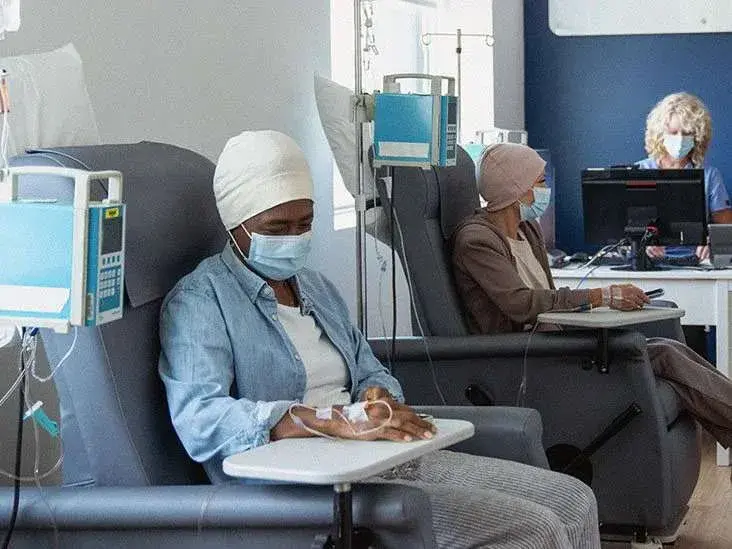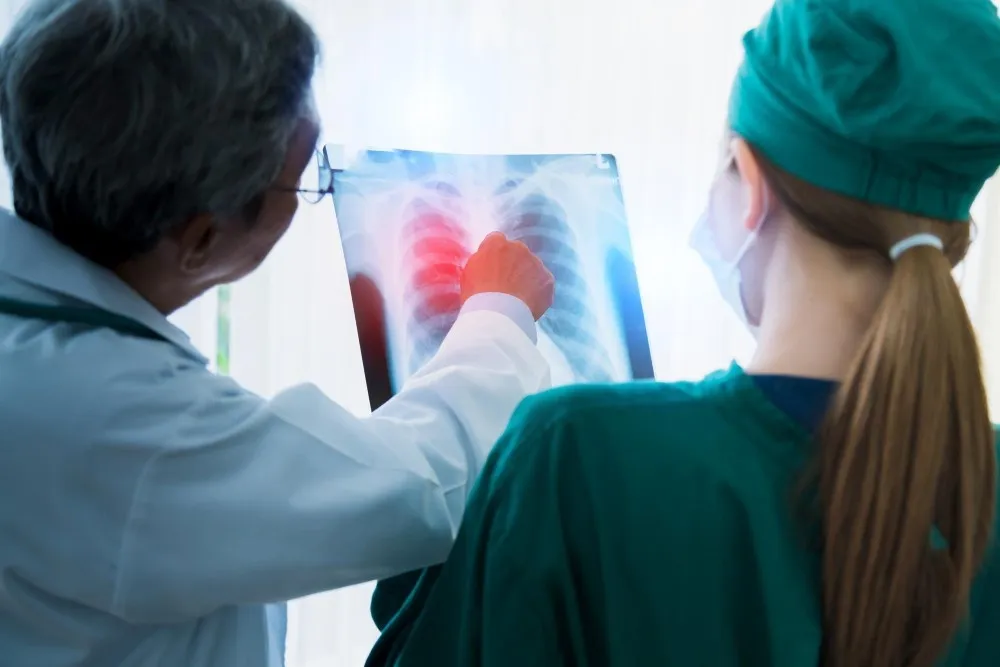Cancer treatments such as chemotherapy can be life-saving, but they often come with side effects that can be challenging to manage. Hair loss is one of chemotherapy's most visible and emotionally distressing side effects. Losing one's hair can be a deeply personal and emotional experience, and knowing how to cope with this change can be difficult. However, the good news is that hair growth after chemotherapy is possible. With the right care and attention, many cancer survivors can regrow their hair and regain a sense of normalcy and confidence. This blog will discuss tips and strategies for growing hair after chemo and some factors affecting hair regrowth. Whether you're currently undergoing cancer treatment or are in the process of recovery, this information can help you feel more informed and empowered to take care of yourself during this challenging time.
What is chemotherapy?

Chemotherapy is a drug treatment that uses powerful chemicals, which may be radioactive, to kill the fast-growing, malignant cells in the body. It is most often used to treat cancer since cancerous cells tend to be fast-growing and multiply much faster than the non-malignant, non-cancerous cells of the body.
What are the potential risks of chemotherapy?
The risks of chemotherapy drugs and the side effects of this vigorous treatment scale can be significant. Each chemotherapy drug has different side effects; some drugs may be considered safe or at least comparatively safe. Chemotherapy drugs can have short-term, temporarily affecting side effects, depending upon the strength of the drugs being used; there can also be long-term, more long-lasting effects. Common side effects of chemotherapy drugs include:
- Nausea
- Vomiting
- Hair Loss
- Diarrhea
- Loss of Appetite
- Fatigue
- Fever
- Mouth Sores
- Physical Pain
- Easy Bruising
- Bleeding
- Constipation
Most of these side effects are either treatable or easily subside after treatment. Long-lasting side effects of chemotherapy drugs include:
- Lung tissue damage
- Heart disease/ heart problems
- Infertility
- Kidney problems
- Nerve damage (viz. Peripheral neuropathy)
- It may also cause a risk of a second cancer
Chemotherapy and hair loss -
Chemotherapy drugs are made to target the fast-growing, cancer-infected cells in the body. However, they cannot differentiate between cancer and regular, healthy cells, including hair follicle cells. When harmful radiation of the degree used in chemotherapy attacks healthy cells, it damages them. So, chemotherapy may cause hair fall. Hair loss induced by chemotherapy is often observed on the scalp. However, it can also affect other body parts with hair growth. It is not entirely impossible to lose eyelashes, eyebrows, underarm hair, pubic hair, et cetera.
The factor of hair loss depends entirely on the type, dosage, and chemotherapy schedule. Not all types of chemotherapy cause hair loss. There have been no research study results about any connection between hair loss or the rate of hair regrowth with a patient's race, hair type, or ethnicity. However, it is advised to consult your treatment team about the side effects, specifically loss of hair, as it is one of the patient's biggest concerns.
11 tips for growing hair after chemotherapy -
When the radiation therapy finishes, hair loss usually recovers. The time it takes and how it regrows depends upon the dosage of radiation you have received. The regrowth may be different— it may grow back curled, thicker, thinner, a different colour, etc. If your treatment includes high doses of the drug, your regrowth may be patchy and incomplete, and the treatment may leave you with permanent hair loss. Growing hair after chemo can take several months to start growing. Here are some tips for growing your hair after chemo:
1. Be Gentle -
One of the most important things you can do to help induce hair growth is to be gentle with it. Hair loss can be harsh on your mental health as well. So, step one is to be gentle with your hair and yourself. The timeline for hair regrowth varies from one person to another. However, irrespective of when your hair might begin to regrow, it will be fragile, and your scalp might be sensitive initially. So be careful how you treat your hair for the first six months post-chemotherapy. You can consult your hair stylist and speak with them about how and to what extent you might undergo hair treatments.
2. Consider Trying Minoxidil (generically known as Rogaine) -
Rogaine (chemically, Minoxidil) is an FDA-approved topical treatment for hair loss. It is mostly used for male baldness. However, research studies have approved that it can be a remedy for alopecia caused by chemotherapy. The studies suggested Minoxidil is not efficient at preventing hair loss during chemotherapy. However, it can significantly help speed up hair regrowth after cancer treatment.
3. Maintaining Health (1.5 Months Post Chemo) -
Patience is hard. However, it is the key to hair growth and personal recovery after chemotherapy. You must maintain proper nutrition. You may go for abundant proteins and some additional biotin or collagen. However, speaking with a nutritionist or healthcare professional is advised.
4. Care for Your Scalp (3 Months Post Chemo) -
After such a rigorous treatment, your scalp is left sensitive. You need to take care of your scalp. Gentle, sulfate-free shampoo may help moisturize your scalp and massage it. For conditioning and massaging, you can use coconut oil. There are also some FDA-approved shampoos, conditioners, and other hair treatments for growth/regrowth. Check with your hairstylist and medical professional, especially if using medicinal products/ chemicals.
5. Essential Oils (6 Months Post Chemo) -
Specific essential oils, such as rosemary, are said to help in boosting your hair growth. Mix it with castor or coconut oil as a scalp treatment. However, be sure to check with your hairstylist and medical team.
6. Keep Your Hair Virgin (9 Months Post Chemo) -
Try as much as possible to limit exposure of your hair to dyeing, bleaching, over-washing, et cetera. Try your hardest to keep your hair virgin, limit your experimenting, et cetera, so you are not compelled to cut your hair. Your hair may feel textured or thick; it may be a different color. However, it is important to trust the process.
7. Take Vitamins and Minerals -
One of the best ways to compensate for hair loss is by taking vitamins and minerals. One way of doing this is to include food items in your daily diet that are rich in vitamins and minerals. You may also take long-term supplements for the same. Biotin, a water-soluble vitamin, is great for triggering thick hair growth. Vitamin E and Vitamin C are beneficial for healthy hair follicles, and Vitamin B effectively improves blood circulation to your scalp.
8. High Protein Food Consumption -
The main constituent of hair, Keratin, is a protein. Therefore, protein becomes one of the most important nutrients for hair. This includes plant nutrients and animal proteins in your regular diet. These changes in your diet increase the efficiency of the growth of your tresses. Some high-protein foods include meat, tofu, eggs, and milk. Lentils, et cetera.
9. Include Inositol -
Inositol is a simple carbohydrate. It can prove to be significantly beneficial in improving your hair growth. This nutrient helps improve scalp cells' functioning, eventually leading to better hair growth. Some foods rich in inositol include leafy vegetables, nuts, citrus fruits, nuts, etc.
10. Take Fatty Acids -
You can include omega-3 and omega-6 fatty acid supplements to help improve your hair growth. Fatty acids are a blessing in disguise for hair regrowth and can significantly help with hair regrowth post-chemotherapy. If you do not wish to take supplements, you can involve foods rich in fatty acids in your daily diet. Examples include flax seeds, herring fish, salmon fish, etc.
11. Use Essential Oils -
Essential oils have been used for improving hair regrowth post-chemotherapy. You can directly apply essential oils such as ylang-ylang, bergamot, rosemary, lavender, and massage or mask your sensitive scalp. These oils also nourish and strengthen hair roots.
Coping with hair loss from Chemotherapy -
Hair loss is an altercation in your physical appearance that tells on-lookers that you may be fighting cancer and undergoing chemotherapy. This may go against your boundaries. Please speak with your medical team about your concerns and the steps you can take to prepare yourself for temporary or permanent hair loss and damage. To cope with the distress, the consequences may cause you, you may choose to cut your hair into a shorter length before it starts falling out, and once it does, you can use a razor to shave it all. Be careful to avoid cuts. Head coverings such as scarves, hats, wigs, et cetera may also be an option. You may even go for the option of purchasing multiple wigs. Some people choose not to cover their heads after their hair falls out.
Conclusion -
Growing hair after chemo can be challenging and emotional, but it symbolises hope and recovery. With patience, self-care, and support from loved ones and healthcare professionals, many cancer survivors can regrow their hair and reclaim a sense of normalcy and confidence. While hair regrowth can be slow and unpredictable, it is important to remember that everyone's journey is unique and that there is no "right" way to regrow hair after chemo. Ultimately, the most important thing is to take care of yourself and prioritise your physical and emotional well-being during this healing and recovery time.
If you are looking for the best expert for you, do not worry, the best oncologist in Hyderabad is here!

Reviewed by







